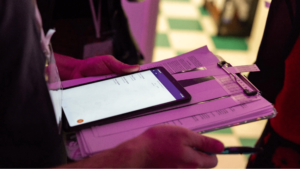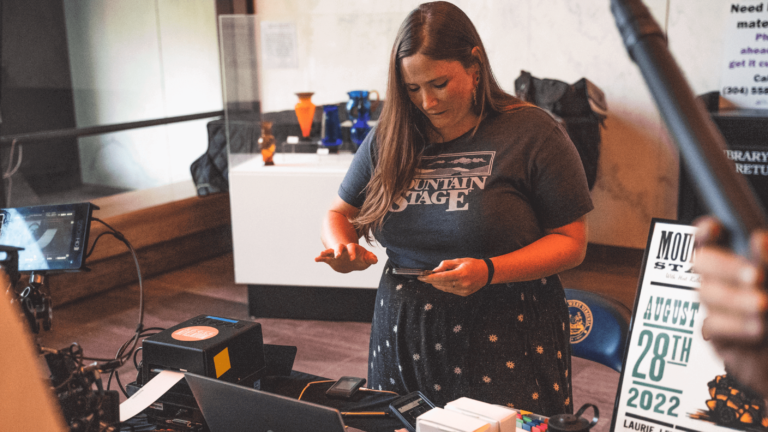Invoicing is good news: it means you’re nearing payday.
But juggling charges, fees, and taxes? Not so thrilling.
As an event organiser, you aim to create unforgettable events, not sift for that ideal event invoice template. So, we’ve crafted a customisable one just for you.
With 800k organisers at Eventbrite, we know the ropes. We realise that for tasks like invoicing, efficiency is paramount, freeing you up for what truly matters: crafting phenomenal events.
In this guide, we detail key invoice components, offer ready-to-use templates for different events, and share savvy insights to accelerate your payments.
Let’s dive in.
How to use our free event planner invoice template
Our free event invoice template is adaptable for all types of events, no matter the size or how many invoices you need to issue.
The event organiser invoice template includes critical information, such as recipient details, payment terms, and the service provided. It’s completely customisable — you can adjust the branding and style you prefer and add or remove sections as needed.
Use your invoice template whenever you need to outsource a service, rather than waiting until the event has finished and then submitting your invoice.
Download this invoice template, complete the required fields with the items you’re invoicing and the supplier’s details, and submit it to the recipients. Make sure you keep a note of the payments received and owed, and save each invoice you send out to stay on top of your accounts.
We’ve also created different versions of this invoice template for different event organisers, with the type of information you need for each event. One thing all your event invoices need to include is payment terms.
What payment terms should you include in your event contract?
Regardless of the event types you work with, creating a clear agreement on payment terms helps avoid misunderstandings between you and the recipients and ensures you receive payments on time.
Here are some of the payment terms you should include:
- Payment schedule: Outline the due dates for payments and any upfront deposits required.
- Late payment fees: Describe the overdue charge if a party fails to pay outside the agreed timeline.
- Accepted payment methods: Specify your accepted payment methods, such as PayPal or bank transfer, helping to streamline the payment process.
- Refund policy: Clarify your refund policy — whether you offer one or not. If you choose to provide refunds, communicate how long it takes to process the payment.
- Currency: State the money currency.
- Taxes: Include information about applicable taxes if you expect recipients to cover these fees, such as sales tax and GST, to ensure they know of any additional costs included in the final price.
On average, it should take between three and 14 days to receive payment. Adding all the necessary information will limit back-and-forths and can help speed up the payment process.
Event invoice template for markets and fairs
Invoicing for markets and fairs involves calculating the individual charges for many vendors — all of whom have used different facilities at your event. Therefore, you must have a solid system in place for billing and invoicing.
There are a couple of ways that you can go about it.
First, you can simply list your billable services, such as:
- Booths or tent rentals
- Equipment hire
- Electricity and water fees
- Promotional services
- Parking
- Insurance
- Cleaning services
- Storage
- Wi-Fi
Specify the duration of the service, the agreed rate per hour, and the total amount owed. The alternative is to offer package deals with a flat fee when promoting your market to vendors.
This can help attract more niche merchants to your market and simplify the invoicing process by saving you from listing each item individually.
For instance, you could employ a ‘what you see is what you get’ pricing policy. At most markets, a 10×10 booth costs £400–700, which includes furniture rental fees, Wi-Fi, and tent costs. You can also promote each vendor on your website before, during, and after the market and in your email marketing chain of subscribers as part of the deal.
📝 How to use our event invoice template for market events: Simply fill in the necessary information for each vendor, including their name and contact details, and then edit the ‘service provided’ section by adding separate items or a package deal.
Event invoice template for event producers and promoters
The first stage of creating an invoice for an event producer and promoter is to decide what pricing system you will use. This depends on the scale and complexity of the event you’re promoting, as well as the services you include.
For instance, some event producers and promoters choose to offer comprehensive packages that include planning, marketing, and secure sponsorships and partnerships all in one, while others may provide individual services.
There are five main pricing models to choose from:
- Flat fee: This is when a producer charges a negotiated fee at the beginning of the contract based on the event’s predicted size and complexity. Flat fees can be beneficial for event creators who work with a large number of clients and need to submit invoices with a fast turnaround.
- Hourly rate: It’s essential to agree before you submit your invoice on what’s considered ‘billable’ and ‘non-billable’ work. For example, the time it took to drive to a venue for inspection may not be considered billable work — and, therefore, you shouldn’t include this on your final invoice.
- Percentage of ticket sales: This is a pricing system where you take a percentage of the total ticket sales after the event as your fee. This percentage can vary depending on your experience, level of involvement, and your type of event. For example, nightclub promoters like MXMV GLOBAL EVENTS can charge a commission that ranges from 20–35%.
- Guarantee plus percentage: This model guarantees you’ll make a certain sum, regardless of how many tickets you sell. You can also take a percentage of ticket sales above a certain quota or threshold. The guarantee fee structure is typically used for mid-level music festivals, concerts, or nightclub parties that are scalable.
- Vendor and sponsor commission: In addition to a fixed or guaranteed fee structure, you may also negotiate with your client to receive a commission from vendors, such as caterers, venues, and security companies, for referrals. This is common for events hosted at different venues or locations, where promoters have the power to negotiate favourable deals with their event network.
For example, Club Indulge hosts events at venues in London and could benefit from this payment model.
Different pricing models suit different types of events, so it’s important to agree on this with your client before signing a project.
📝 How event promoters and producers can use our event invoice template: Customising the event invoice template for event promoters and producers depends on the pricing structure you choose. For hourly rates, the template is straightforward; simply list the billable services under the ‘services provided’ column alongside your hourly rate and the total price.
Keep track of ticket sales with Eventbrite

One way to ensure that the numbers you’re quoting for ticket sales are accurate is to use event management software. Eventbrite is an all-in-one event registration, marketing, and ticketing platform that helps track ticket sales with real-time data and allows you to view and export order reports.
For example, The Country Music Experience produces various music events in different venues across the UK. When employing a ticket-sale commission model, The Country Music Experience can use Eventbrite’s mobile app to monitor check-ins and ticket sales on the go, ensuring they have all the information they need to invoice their clients correctly.
Event invoice template for live venues
Live venues, such as nightclubs, bars, and restaurants, mainly use an event invoice template to bill clients who hired their venue for live performances.
This type of invoice should focus more on the costs and fees associated with organising and facilitating the event. Therefore, it’s important to break down all costs and fees, not just the venue rental fee, so you can include this on your invoice. This level of detail can help communicate the value of your offering, as well as justify the final price tag.
Your pricing package might cover the following:
- Venue rental
- At-door security
- Waitressing and bartending
- Sound and lighting equipment hire
- Stage setup and teardown
- Cleaning fees
- DJs or live artists
- Commission from merchandise sales
- Coat checks
- Bottle service
- Private booths
- Decor and staging costs and damages
When calculating how to invoice for renting your venue, it’s also important to consider any licensing fees that may impact service.
For example, if you’re a licensed restaurant that pays annual renewal fees and a client wants to serve alcohol at their event, you may include a small levy to cover a portion of this charge.
Similarly, suppose you regularly rent out your venue. In that case, you may need to invest in premium insurance that covers incidents at your venue. Your invoice should reflect this extra service.
📝 How live venues can use our event invoice template: Utilise the event invoice to represent every cost that went into calculating the total price of your venue. This will help eliminate confusion as it should correlate precisely with the price agreed upon before the event.
Event venues can even send out invoices to event organisers before the event, allowing you to address any discrepancies in pricing or services before the event takes place, avoiding any confusion or disputes after the event.
For example, Pitcher & Piano in Nottingham rents its venues to multiple event creators, such as the Festive Showcase, Discos for Grown Ups, and MySpeedDate. Despite the differences between these events, Pitcher & Piano could use the event invoice template to ensure they include all related costs.
Streamline payment by using the best event invoice template in 2024
Invoicing might be boring, but it doesn’t need to be difficult.
The above customisable event invoice templates simplify the invoicing process and ensure all the information you need is on the document so you can receive payments as soon as possible.
Eventbrite can help you streamline all aspects of your event and supplier relationship management, from ticketing and event registration to marketing.
Our platform simplifies the event management process and ensures event organisers have everything they need to run unforgettable experiences in one place.






